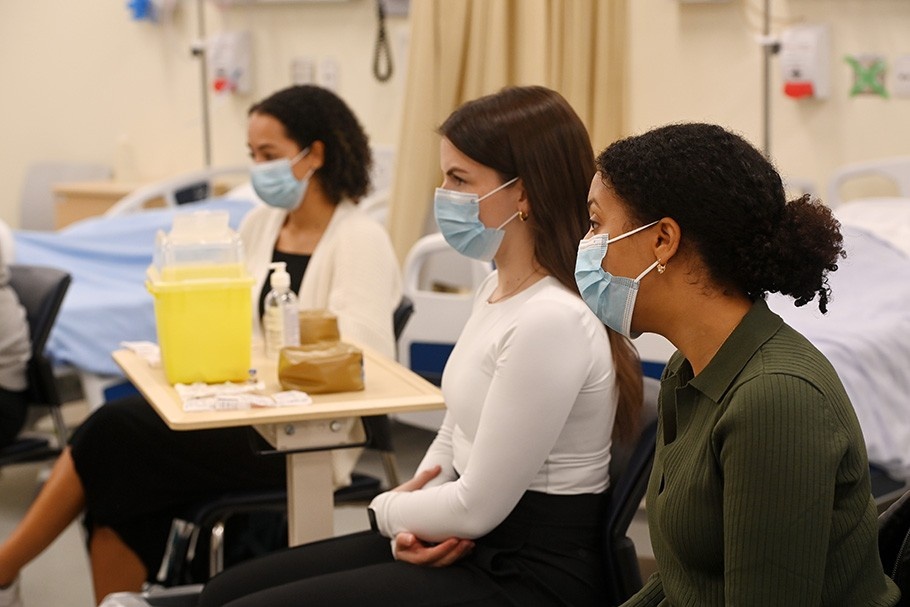Med 2 core units

Med 2 is a combination of systems-based units teaching clinical knowledge and professional competencies (physician practice challenges). The following core units run from September-May of each academic year.
Neurosciences (Central Nervous System and Special Senses)
This unit introduces you to the anatomy of the head and neck, serving as a bridge to neuro-anatomy. You'll learn the pathophysiology of atherosclerosis, the clinical manifestations of atherosclerosis throughout the body, and the burden, manifestations, physical effects, detection methods and ways to address emotional dysregulation.
In addition to basic anatomical and physiological content, this unit focuses on the nervous system as it relates to neurological disorders and psychiatric conditions. You're also introduced to the special senses of vision and cochlear/vestibular dysfunction as they relate to clinical neurosciences.
Metabolism II (Cardiovascular, Respiratory and Renal)
This unit presents the major diseases of the cardiovascular, renal and respiratory systems. All three components of the unit include pediatric and adult conditions.
Case-based learning sessions focus on the pathophysiology and clinical presentation of the major types of cardiovascular, renal and respiratory disease with appropriate coverage of physiology.
Lectures and laboratory sessions present content on normal human physiology, anatomy and histology as well as the pathophysiology and principles of management of diseases affecting these three systems.
Muscoloskeletal & Dermatology
This unit addresses patient mobility and function in the performance of work, recreation and activities of daily living. Academic sessions focus on the unique elements of the clinical assessment required by the clinician for effective diagnosis and management of musculoskeletal and dermatologic conditions.
Palliative Care, Oncology, and Geriatrics
By the end of the Integration unit, you'll be able to use a patient-centred approach in developing an appropriate care plan for a variety of diseases and disorders.
Professional Competencies II
This is the second year of a two-year, longitudinal unit that includes a weekly two-hour tutorial followed by a one-hour large group session. This unit provides you with the opportunity to integrate your biomedical and clinical learning within the context of patient care from a professional, community, and life-long learner perspective.
Content includes public health and infectious disease management in the community, end-of-life decision-making and other ethical challenges, patient safety and other system and quality improvement approaches, social accountability and global health, physician wellness and career paths, and the Health Mentors Program.
Key concepts come from population health, epidemiology, ethics, law, informatics, health policy and the humanities. The unit is highly applied and case-based, and closely integrated with the other Med 1 units through shared cases and topics.
Skilled Clinician Program
Through the use of a variety of assessment methodologies and a learning portfolio, this four-year program helps you keep track of your learning and development throughout the MD program.
Research in Medicine (RIM)
The RIM program is an integral component of the undergraduate medical program for all medical students enrolled at Dalhousie Medical School. It’s the first program of its kind in Canada, and it’s intended to develop skills of critical thinking and creativity through a mentored research project conducted longitudinally throughout the four-year curriculum.
Electives
Electives provide you with opportunities to explore specific areas of medicine you're interested in. During elective time, you'll develop and execute a personal project under the guidance of physician preceptors. In Med 2, electives take place in Halifax or Saint John.
Interprofessional Health Education
Students in the Faculties of Dentistry, Health Professions and Medicine are required to participate in interprofessional health education activities. These activities, together with specific program requirements, are currently evolving and in transition and are integrated into the curricula of individual programs. Participation is mandatory. The objective of interprofessional education include developing:
- knowledge and understanding of, and respect for, the expertise, roles and values of other health and human service professionals
- understanding the concept and practice of patient/client/family-centred care.
- effective communication, teamwork and leadership skills applied in interprofessional contexts.
- positive attitudes related to the value of collaboration and teamwork in health and human service contexts.
- an understanding, from a multi-disciplinary perspective, of the Canadian health and social systems, the legal send regulatory foundation of professional practice, how health and human service institutions are organized and operate, and how different health and human service professions contribute to the systems and institutions.
During each year of the four-year undergraduate medical education program, learners will be required to participate in IPE activities. In years 1 and 2, some activities will be embedded in their curriculum, and others will be elective. In year 3 there are multiple embedded interprofessional learning activities during several clerkship rotations. During the final year of the medical program, all students are required to particpate in an interprofessional educational elective, in a collaborative setting.
Contact ugme@dal.ca for more information.
